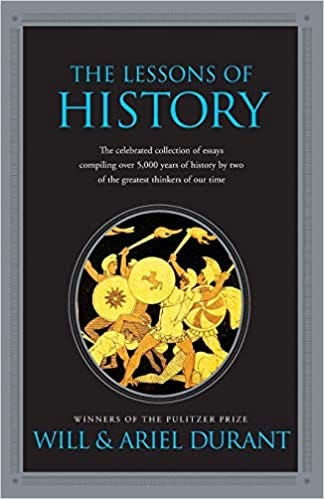
Hey Everyone,
Welcome back to The Chomp—your weekly dose of the best strategic thinking content and top emerging business trends from the internet and beyond. If you’ve been sent this email and you’re not a subscriber, you can join by clicking on the blue button below. With that, let’s dive into it.
Quick Bite
The Love of Truth and the Truth of Love: Bertrand Russell on the Two Pillars of Human Flourishing: The moral thing I should wish to say… is very simple. I should say: love is wise, hatred is foolish. In this world, which is getting more and more closely interconnected, we have to learn to tolerate each other. We have to learn to put up with the fact that some people say things that we don’t like. We can only live together in that way and if we are to live together and not die together, we must learn the kind of charity and the kind of tolerance which is absolutely vital to the continuation of human life on this planet.
With less than a month to go until the Presidential election, it feels as though tension and division in the United States are at an all-time high. Watching Tuesday night’s debate was a sad, cringeworthy, and embarrassing experience. Despite an ongoing global pandemic, where one might expect to see unity against a common enemy, people across the country are at each other’s throats—both literally and figuratively.
How, and why, we got to this point is a long and complicated story. And one that I don’t have much interest in extrapolating on. For that, I’d point you to Tim Urban’s phenomenal web-series, The Story of Us. What I’m more interested in is the path forward. America has come to somewhat of an inflection point, and if we don’t change course, our future might not be as bright as we’d like it to be.
So, rather than analyzing the type of article I typically do in this section, this week I’m sharing Maria Popova’s timely article highlighting the words of Bertrand Russell. At a point of inflection, one of the best tools we have is reflection. Reflecting on Russell’s words are a great place to start.
Deeper Dive
The Disappearing Bank: Banks are increasingly replaceable. "Embedded finance" makes it easy to deliver financial services in context. Over time, that may result in money gravitating towards influencer-run financial institutions. This could have significant ramifications for how society manages its surplus.
Aside from commerce, no industry has stood the test of time as long as banking. Dating back to 2000 BC, humans have been refining the craft of banking for over four thousand years. While banks today bear little resemblance to those of the Byzantine Empire, the premise of banking remains nearly the same. Banks take non-translatable assets in and turn translatable assets out. In goes grain or corn, and out comes money.
Once a translatable asset is established, banking serves three main purposes.
Facilitating payments between two parties
Collecting deposits and storing money for future use
Distributing loans
Without deposits, loans would be impossible. To fund loans, banks need to have a surplus of capital, which stems from deposits. Deposits and loans work together in what can either play out as a virtuous or vicious cycle. In the latter case, such as the years leading up to 2008, this cycle laid the groundwork for calamity.
When the Great Recession happened, people quickly started to lose trust in their banks. The same holds true for countless events throughout the course of history. When this has happened historically, people who no longer trusted their banks didn’t have too many options. Aside from taking whatever money they had left out of the bank and keeping it in cash, there weren’t really any other alternatives.
However, following 2008, this has started to change. Over the past decade, we’ve seen more innovation in the way people store their money than in the past few centuries combined. Banks have undergone a complete redesign for the digital world. Bitcoin and digital currencies emerged as a completely new way to store surplus wealth. People are no longer stuck storing their money in the Bank of America or local community bank down the street. They have options now.
And as Mario Gabriele highlights in this excellent article, we’re likely to have even more options in the future. The rise of fintech has led to a new world of embedded finance. Tools like Stripe and Affirm have enabled platforms like Shopify to offer a range of financial products. We’ve entered a new age where banks aren’t necessary to provide the services of banking.
This shift likely won’t spell the end for traditional banks, but it will force them to innovate and adapt. The banks of the future will continue to look less and less like the banks of the past.
Chum Bucket
Coinbase is a Mission Focused Company (Brian Armstrong - Medium)*
This Overlooked Variable Is the Key to the Pandemic (The Atlantic)
The Trump- Biden Debate (Wait But Why)
Austin Emerges as a Hot Spot for Silicon Valley Investors (The Information)
*This created quite a stir in the tech world this week and sparked heated debate.
Tweet of the Week

Song of the Week
Apple Music Link
Books
Currently Reading

![Grant by [Ron Chernow] Grant by [Ron Chernow]](https://substackcdn.com/image/fetch/w_1456,c_limit,f_auto,q_auto:good,fl_progressive:steep/https%3A%2F%2Fbucketeer-e05bbc84-baa3-437e-9518-adb32be77984.s3.amazonaws.com%2Fpublic%2Fimages%2Feb6221ed-8853-4848-8251-b88c5f52c599_324x500.jpeg)
Recently Read
![The Psychology of Money: Timeless lessons on wealth, greed, and happiness by [Morgan Housel] The Psychology of Money: Timeless lessons on wealth, greed, and happiness by [Morgan Housel]](https://substackcdn.com/image/fetch/w_1456,c_limit,f_auto,q_auto:good,fl_progressive:steep/https%3A%2F%2Fbucketeer-e05bbc84-baa3-437e-9518-adb32be77984.s3.amazonaws.com%2Fpublic%2Fimages%2F28c09c29-7431-4b22-9bfa-30528d0c83e6_319x500.jpeg)
When Morgan Housel released his new book, The Psychology of Money, I couldn’t wait to get started. Despite generally avoiding the hype of new releases to focus on books that have stood some test of time, I figured diving into Housel’s new work would be worth it. And it certainly was. Housel has the unique ability to take dry and complex topics and turn them into thoughtful and digestible stories. The Psychology of Money is filled with practical takeaways and is worth a read for anyone interested in being better with their money. My guess is that’s most of us. (

The Lessons of History is nothing short of a masterpiece. Will & Ariel Durant’s achievement of distilling the most important lessons of over 5,000 years of history into 128 pages is truly remarkable. There are very few books I’ve read that offer as many interesting takeaways on a per-page basis. This is a book that I’ll repeatedly be coming back to my notes on for a long time. (5/5)
Parting Thoughts
This Week in History
On September 29, 2011, Patrick and John Collison launched Stripe. Nine years later, Stripe is valued at $36B as of their most recent funding round this past April. (Source)
“All cruelty springs from weakness.”
— Seneca
If you found something that piqued your interest this week, please help me out in expanding the reach of The Chomp by forwarding it along to a friend or sharing it with others in your network. Until next week.
-CM
This newsletter is created and authored by Cody McCauley and is published and provided for informational purposes only. The information in the newsletter solely constitutes Cody’s own opinions. None of the information contained in the newsletter constitutes—or should be construed as—investment advice.



